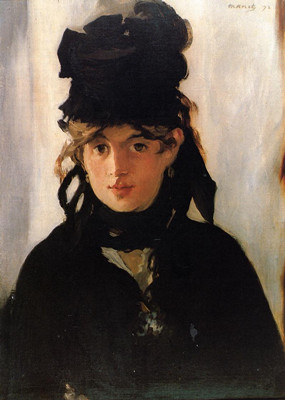The portraits of Edouard Manet
爱德华·马内的肖像画
Bold and strange
勇辟蹊径,立异标新
He worked to imbue his paintings with life as no photograph could
马内画笔下的人物生动形象,照片难以匹敌
THREE portraits share a wall. In one a dark-eyed, forthright beauty stares at the viewer; another features a scarlet-lipped, tormented woman ringed by an inky sea of grief. The final image is of a wary creature with a pert nose who shivers in her furs. Each is so different in mood and technique that it is remarkable that they were all painted by Edouard Manet between 1868 and 1874. More remarkable still, the sitters are the same woman: Berthe Morisot, a fellow painter. These paintings and others make a show of Manet's portraits at the Royal Academy in London one not to be missed.
面墙,三幅肖像画。第一幅,一位黑眼睛美人凝视前方,神情真挚,仿佛盯着观众;另一幅中,一位女子唇如烈焰,神情痛苦,四周弥漫着浓浓的悲伤。最后一幅,画中人鼻子小巧笔挺,一副小心谨慎的样子,在皮草里瑟瑟发抖。这三幅作品的基调与技巧迥然相异,却都是爱德华·马内在1868年至1874年间所创作的,实在了不起。更厉害的是,画中的模特儿是同一位女子:马内的同行—画家贝尔特·莫里索。这三幅画还有其他一些作品正在伦敦皇家艺术院的一个马内肖像画展览中展出,实在不容错过。

On view are some 50 paintings and works on paper. Inspired by the dramatic masterpieces of Francisco Goya and Diego Velázquez (all those luscious blacks), and Frans Hals's genius for portraying people with a gusto for life, these works trace Manet's influences and his efforts to master a vision of his own. Grouped by theme, the portraits are spotlit against dark walls as if each was a jewel. Many are, though the curators could have exercised more discretion. A stronger show would have been a smaller one; arranged chronologically, it could have revealed more about the artist.
展览有大约50幅油画及素描。这些作品是马内被弗朗西斯科·戈雅、迭戈·委拉兹开斯出色的大作所感染,又受佛兰斯·哈尔斯画人物栩栩如生的本领所启发而创作的,从中可以看出马内受到哪些前辈的影响以及他为追求个人风格所做的努力。这些肖像画按主题展出,挂在黑暗的墙上用聚光灯照亮,仿佛每幅画都是一件珠宝。其中很多确实被视为珠宝,不过馆长考虑得还不够周到。如果规模小些,展览会更有感染力,如果作品按时间顺序展出,人们就可以更加了解马内。
Seductive, witty and intelligent, Manet was also financially independent. Few of these portraits were commissions. His pianist wife can be seen in several glowing, affectionate works, and Manet painted some arresting portraits of his friends. The canvasses of Victorine Meurent, a professional model, radiate a sexual charge. This is as true when she is wearing a simple shirt as when she is seen naked at a picnic in the company of fashionably dressed men in his famous painting “Le dejeuner sur l'herbe”. Meurent inspired haunting and unforgettable works, including Manet's greatest one, “Olympia”, which is unfortunately not in this show.
马内本人迷人、诙谐、睿智,经济也比较宽裕。这些肖像画往往不是受人委托而画的。好几幅色彩鲜艳、充满深情的作品里,都可以看见马内那位钢琴家妻子的身影,马内还为朋友们画了一些出彩的肖像画。有些油画画的是职业模特维多利安·莫涵,在画中她散发着一种性感的魅力。这种魅力不论莫涵只穿一件简单的衬衣,还是像马内另一幅著作《草地上的野餐》那样一丝不挂地与衣着入时的男子们野餐,你都能感受得到。莫涵激发了马内的灵感,使他画出了许多深入人心的作品,其中包括最著名的《奥林匹亚》,可惜这幅画不在本次展览中。
Manet hated the thought that his paintings would be seen jammed together. Here the hanging could not be more generous; a cynic might say stretched out. One gallery is devoted to a map of Paris. “Music in the Tuileries Gardens”, a freely painted park scene from 1862, has a room to itself. This crowded vision of men in top hats and women in fashionable bonnets is not actually a portrait, but viewers can make out the figures of Manet and Charles Baudelaire, a poet. Unstaged and exuberant, his evocation of the bourgeoisie at play has been called “the first truly modern picture”. It was brutally attacked at the time.
马内不喜欢自己的作品被挂得密密麻麻地展出。而这次,展览场地可谓宽敞至极,有人可能会挖苦说简直是空旷。有个展厅专门用来展览一幅巴黎地图。《杜乐丽花园中的音乐》也有一个专门的展厅,画中人山人海,男士们戴着大礼帽,女士们戴着时尚软帽。其实这幅不算肖像画,不过观众可以从中认出马内和诗人查尔斯·波德莱尔。这幅活泼随性的资产阶级玩乐图如今被尊为“第一幅真正的现代画”,但在当时却遭到猛烈抨击。
The critics shredded Manet. They mocked his inconsistent style; his refusal to respect conventions. Their vicious words were like “lashes of a whip”, Manet once wrote. Yet he had contemporary champions, including Baudelaire, Stephane Mallarme, a symbolist poet, and Emile Zola, a novelist. Younger artists, such as the nascent Impressionists, also admired him. Pierre-Auguste Renoir observed that Manet was as important to them “as Cimabue or Giotto were to the Italians of the Quattrocento.” His influence continues. Rineke Dijkstra, a photographer, credits Manet with helping inspire contemporary large-format portraits.
那时,评论人士将马内批得体无完肤。他们讥讽马内的画风前后矛盾,笑话他不尊重传统。他们的毒舌就像“鞭子的抽打”,马内曾写道。但也有一些同时代的人拥护马内,包括波德莱尔、象征主义诗人斯忒法·马拉美及小说家埃米尔·左拉。年轻一代的画家也很崇拜他,如早期的印象派画家。皮埃尔-奥古斯特·雷阿诺说,马内之于其拥护者,就如契马布埃或乔托之于十五世纪的意大利那样重要。时至今日,马内的影响力依然未减。摄影师日尼科·迪克斯特拉认为,马内是现代大幅肖像画发展的功臣。
As it happens, Manet's own style was in part a response to the rise of portrait photography. By the time he was in his 30s it seemed “everybody” wanted such a photograph, himself included. He understood this presented a challenge for painters, and so he set out to make his portraits “boldly strange”, argues Carol Armstrong, an art historian. This show may not be without disappointments, but it offers ample evidence of why Manet is revered.
当时恰逢人物摄影兴起,马内自己的画风多少受此影响。在马内三十多岁那个年代,似乎“每个人”都想要一张自己的照片,马内也不例外。美术史家卡罗·阿姆斯特朗认为,马内深知摄影给画家带来了挑战,于是他打算创作出“大胆而新奇”的肖像画。这次展览可能会有不尽人意之处,但也能充分说明为什么马内如此备受推崇。













